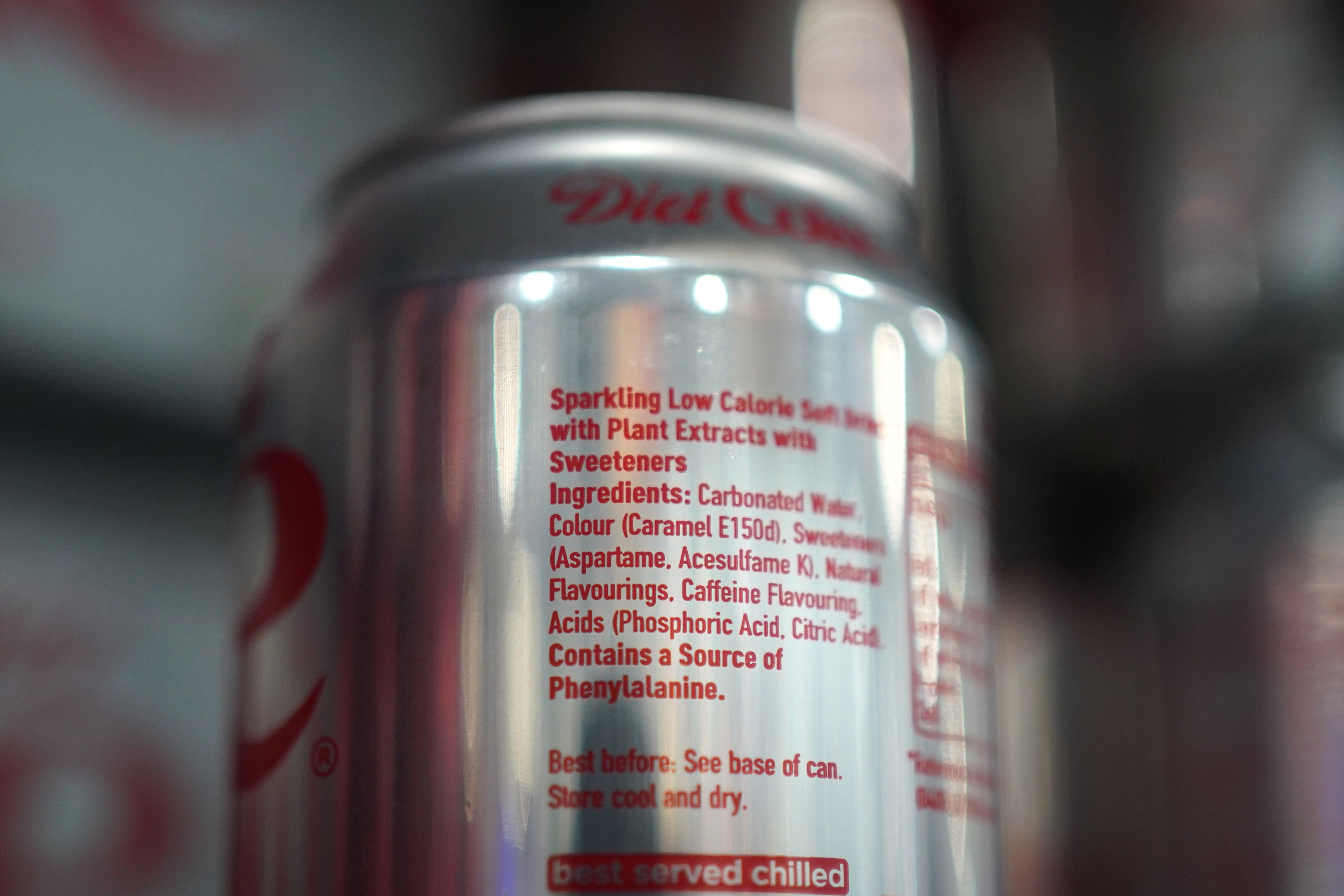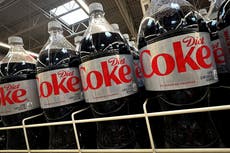Aspartame: How dangerous is it for your health and what does it do to your body?
Health groups ‘advising a bit of moderation’ on aspartame consumption
Aspartame, a sweetener found in Diet Coke and other sugar-free products, has been found to be possibly carcinogenic in high doses.
Two groups linked to the World Health Organisation (WHO) released a long-awaited report on Thursday which found that the product, also found in Extra chewing gum, is a potential hazard. But a person would need to drink the equivalent of around nine to 14 cans per day to be at risk.
Dr Francesco Branca, director of the WHO’s department of nutrition and food safety, said: “We’re not advising consumers to stop consuming (aspartame) altogether. We’re just advising a bit of moderation.
“The assessments of aspartame have indicated that, while safety is not a major concern at the doses which are commonly used, potential effects have been described that need to be investigated by more and better studies.”
But what are the possible side effects of aspartame and how much is safe to consume?
What is aspartame?
Aspartame has been used in the UK as a sugar substitute for decades and has shown up in supermarket favourites such as Diet Coke and Extra gum.
It was discovered by accident in the lab by American chemist James Schlatter in 1965 after he licked it off his finger – against work safety regulations.
Coca-Cola said on its website: “It’s around 200 times sweeter than sugar, so we use it in very small amounts, but it’s calorie-free.
“Sweeteners such as aspartame are tightly regulated and can only be used once their safety has been rigorously assessed.”
The NHS has said there have been reports that the use of sweeteners is linked to other health issues but has dismissed the evidence as “limited”.
However, the National Health Service has said that aspartame is not suitable for people with phenylketonuria, a genetic condition that prevents the breakdown of amino acids in the body. If untreated, it can lead to brain damage.
Aspartame can appear on a list of ingredients in foods and drinks under its E-number name E951.

Why was the WHO reviewing the safety of aspartame?
The review was prompted by two studies that reignited questions about the health effects of the additive.
The NutriNet-Santé cohort published their study last year from 100,000 people in France which found that high consumption could lead to different types of cancer.
The second study analysed the Ramazzini Institute’s research into rats and mice which saw that the rodents could be more likely to develop cancers if they were exposed. In addition, it was found that the offspring of the mice were more likely to develop these cancers.
The Ramazzini study was criticised for its testing on animals rather than humans and the NutriNet-Santé test was said to show correlations rather than cause and effects, and the study’s participants were also found to be of limited demographics.
Nonetheless, it was enough to see the WHO look into it further.

How many products use aspartame?
Diet Coke, Coke Zero, Pepsi Max and 7 Up Free are all drinks that contain aspartame.
The sugar substitute can also be found in gelatine, ice cream, dairy products such as yoghurt, breakfast cereal, toothpaste and medications such as cough drops and chewable vitamins.
A number of drinks of similar substance do not have aspartame – and you can see a full list on our separate explainer here.
What is a possible carcinogen?
A substance that is carcinogenic has the potential to cause cancer.
Under the WHO's International Agency for Research on Cancer guidelines, there are four possible classifications associated with cancer: carcinogenic to humans (Group 1), probably carcinogenic to humans (Group 2A), possibly carcinogenic to humans (Group 2B) and not classifiable (Group 3).
Aspartame has been listed as “possibly carcinogenic”.
It means that it can be consumed but not in huge amounts and that further research might be required.
How much aspartame can I safely consume?
The Food and Agricultural Organisation's Joint Expert Committee on Food Additives, which carried out a complementary study, retained its advice that it is safe for a person to drink 0-40mg per kilogram of body weight each day.
The WHO said a person weighing 70kg would need to consume between nine and 14 cans of diet soft drink per day to exceed the daily guideline.
What are the side effects of aspartame?
As the NHS pointed out, there are no immediate proven health risks beyond those with phenylketonuria.
As only a trace amount of aspartame is needed to sweeten foods considerably, it is linked with diet foods and can be used in diets of those looking to lose weight.
However, it has conversely been linked with an increased appetite. Foods with aspartame are often ultra-processed which can often be linked to foods causing weight gain, which is perhaps ironic considering the additive’s place in diet products.
"Treat them as an element of the diet which we should discourage," said Dr Branca, "sugar sweeteners do not belong to a healthy diet."
For now, though, it is unlikely aspartame will disappear from supermarket shelves.
Join our commenting forum
Join thought-provoking conversations, follow other Independent readers and see their replies
Comments



Bookmark popover
Removed from bookmarks